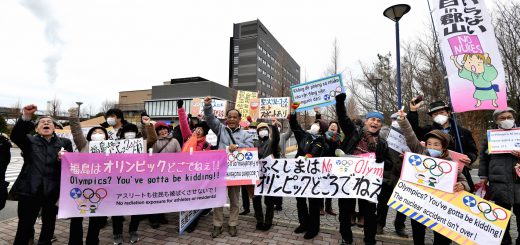Open letter to Japanese ministers demanding a policy change from releasing contaminated water into the ocean to storing it on land.
On October 27 the Japanese government will make an official decision on allowing the release of over 1 million tons of contaminated water from the Fukushima Daiichi Nuclear Power Station into the Pacific Ocean. CNIC issued the following open letter to the Ministers listed.
To: Koizumi Shinjiro, Minister of the Environment
Suga Yoshihide, Prime Minister of Japan
Kajiyama Hiroshi, Minister of Economy, Trade and Industry
Hirosawa Katsue, Minister of Reconstruction
Motegi Toshimitsu, Minister for Foreign Affairs
Nogami Kotaro, Minister of Agriculture, Forestry and Fisheries
Kato Katsunobu, Chief Cabinet Secretary
From: Ban Hideyuki, Nishio Baku, Yamaguchi Yukio,
Co-Directors of Citizens’ Nuclear Information Center (Registered NPO)
21st October 2020
According to media reports, the government is planning to release the contaminated water accumulated at the Fukushima Daiichi Nuclear Power Station into the ocean. However, this is strongly opposed by fishermen’s groups along the coast of the Tohoku region. They claim that the radioactivity released by the explosion at the Fukushima Daiichi Nuclear Power Station has devastated the coastal fishery in Fukushima Prefecture. For the last 10 years they have only been allowed to catch fish for radiation monitoring purposes and just as their accumulated efforts have finally reached the stage where the monitoring period will end, again, radioactive material will be released into the ocean. “Our blood, sweat and tears will all be for nothing.” This is the reason for their fierce opposition. For fishermen, fishing is not just an economic activity, but their livelihood itself, which encompasses the pride and joy of living the life of a fisherman. You must not take this away.
In addition, TEPCO promised during negotiations regarding the contaminated water from the groundwater drains, that it would not be released into the ocean unless the fishermen groups agree.
Civil society groups, including the Citizens’ Nuclear Information Center, have long opposed ocean release and have proposed instead that the contaminated water continue to be stored on the ground and in future mortar solidification be carried out. In addition, before solidification, we believe that tritium separation technology should be developed.
The government cites limited storage space and accelerated reconstruction as reasons for the release, but the Fukushima Daiichi site does have space for additional storage tanks. For example, by utilizing the location on the north side of the site, which is regarded as a dumping ground, space for adding tanks can be secured. This dumping site is planned mainly as a place to dump the soil from the planned construction site for the fuel debris storage building. But it could also be used to build semi-underground tanks to hold the contaminated water. The soil below about 10 cm from the surface at this site is not contaminated, so if deep excavation takes place, there should be no legal problem in transporting the soil to the interim storage facility. The Ministry of the Environment should make efforts to obtain agreement through discussions with the landowners.
In addition, although the government claims acceleration of reconstruction is another reason why there is no space, in reality there is no prospect that radioactive waste in the Fukushima Daiichi plant, such as fuel debris, if it is finally removed, and waste generated in the ALPS process, can be transported out of Fukushima prefecture for a very long time. It will have to be stored on the premises. It is inevitable that the Fukushima Daiichi site will become a storage place for radioactive waste. If the government decides on ocean release, it will cause great damage to fisheries groups along the northeastern coast. It will cause actual damage, not just bad rumors. The impact will be not only within Japan, but will also be felt abroad. There is a high risk that import bans on Tohoku goods will continue for a long time, and that countries that have lifted their embargo may reapply it. This would not be limited to produce from Tohoku, but may cover goods from a wide area of Japan. According to media reports, China “hopes to make a careful decision after thorough consultation with neighboring countries.” The South Korean government is also opposed to ocean release. Ocean release is inevitably an international issue. The economic damage it would caused to Fukushima Prefecture is large, and it is not a problem that can be solved by the government providing fishery compensation. The government argues that reconstruction will be delayed if it is not released into the ocean, but it goes without saying that long-term economic damage will hinder reconstruction.
Reconstruction is not defined solely by the progress of decommissioning work on the Fukushima Daiichi site. Isn’t it also important for the local community to regain its normal daily life? Ocean releases are carried out for decades. Even tritium and radioactive materials that have been re-treated to meet safety standards, accumulate in the environment. They can then enter the marine ecosystem and become concentrated as they move up the food chain. This will inevitably result in possible exposure effects on humans.
The government should change its policy. Dangerous radioactive materials should be stored on land, not dumped in the ocean.

